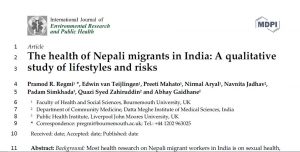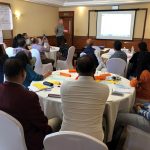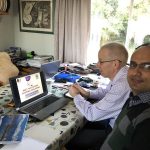 Today the International Journal of Environmental Research and Public Health accepted our paper ‘The health of Nepali migrants in India: A qualitative study of lifestyles and risks’ [1]. The research in this paper was funded through Connect India is Bournemouth University’s Hub of Practice for the Indian subcontinent. It brought together a community of researchers, educators, practitioners and students, both at Bournemouth University and across the Indian subcontinent.
Today the International Journal of Environmental Research and Public Health accepted our paper ‘The health of Nepali migrants in India: A qualitative study of lifestyles and risks’ [1]. The research in this paper was funded through Connect India is Bournemouth University’s Hub of Practice for the Indian subcontinent. It brought together a community of researchers, educators, practitioners and students, both at Bournemouth University and across the Indian subcontinent.
The lead author, Dr. Pramod Regmi, is lecturer in International Health in the Department of Nursing & Clinical Science. His co-authors are based in the UK, Nepal and India. BU authors are: Pramod Regmi, Edwin van Teijlingen, Preeti Mahato and Nirmal Aryal as well as BU Visiting Faculty Prof. Padam Simkhada. The International Journal of Environmental Research and Public Health is an interdisciplinary Open Access journal, hence when published this paper will be freely available to readers across the globe, including India and Nepal.
Reference:
- Regmi, P., van Teijlingen, E., Mahato, P., Aryal, N., Jadhav, N., Simkhada, P., Syed Zahiruddin, Q., Gaidhane, A., (2019) The health of Nepali migrants in India: A qualitative study of lifestyles and risks Journal of Environmental Research & Public Health (forthcoming)
 Nepali migrants’ health & wellbeing: Setting research priorities
Nepali migrants’ health & wellbeing: Setting research priorities Nepali migrant workers in India #GlobalFoL17 presentation in Delhi
Nepali migrant workers in India #GlobalFoL17 presentation in Delhi Migrant workers & mental health in Nepal
Migrant workers & mental health in Nepal BU contributes to International Conference in India.
BU contributes to International Conference in India.










 Nursing Research REF Impact in Nepal
Nursing Research REF Impact in Nepal Fourth INRC Symposium: From Clinical Applications to Neuro-Inspired Computation
Fourth INRC Symposium: From Clinical Applications to Neuro-Inspired Computation ESRC Festival of Social Science 2025 – Reflecting back and looking ahead to 2026
ESRC Festival of Social Science 2025 – Reflecting back and looking ahead to 2026 3C Event: Research Culture, Community & Cookies – Tuesday 13 January 10-11am
3C Event: Research Culture, Community & Cookies – Tuesday 13 January 10-11am Dr. Chloe Casey on Sky News
Dr. Chloe Casey on Sky News ECR Funding Open Call: Research Culture & Community Grant – Application Deadline Friday 12 December
ECR Funding Open Call: Research Culture & Community Grant – Application Deadline Friday 12 December MSCA Postdoctoral Fellowships 2025 Call
MSCA Postdoctoral Fellowships 2025 Call ERC Advanced Grant 2025 Webinar
ERC Advanced Grant 2025 Webinar Horizon Europe Work Programme 2025 Published
Horizon Europe Work Programme 2025 Published Update on UKRO services
Update on UKRO services European research project exploring use of ‘virtual twins’ to better manage metabolic associated fatty liver disease
European research project exploring use of ‘virtual twins’ to better manage metabolic associated fatty liver disease